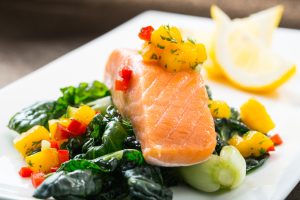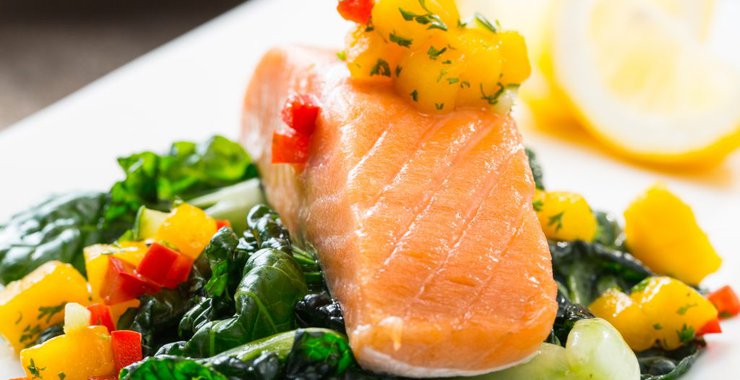By Emily Ackerberg, Dietetic Intern
Have you ever considered that your food could be the reason you feel depressed, forgetful, or just in an overall funky headspace? If you haven’t, read on! Being deficient in a few very common nutrients can have an incredible impact on our mood and brain function. We are here to give you the tools and information you need in order to prevent and alleviate some of the negative symptoms that can arise when we don’t consider what nutrients we may be missing out on. The best part? They’re all found in foods you probably love already!
Let’s talk Nutrients
Folate is an important nutrient to focus on when talking about depression. Deficiency in Folate has been demonstrated to cause decreased serotonin synthesis in humans. Serotonin is a feel-goodchemical that we want to be sure we’re making enough of. It influences our sleep, memory, and risk of developing depression.
Where can you find it? Luckily, folate is in many different foods making it very easy to get your 400-600 micro-grams per day! Folate is found in:
- Spinach
- Collard greens
- Kale
- Turnip greens
- Romaine lettuce
- Asparagus
- Broccoli
- Citrus fruits
- Beans
- Peas
- Lentils
- Avocado
- Seeds
- Nuts
- Carrots
- Squash
Vitamin B12 deficiency also has links to depression, particularly with women. Vitamin B12 is essential for our body to process folate, serotonin, and fatty acids, which all play a role in our mental health. Most of us are getting an adequate amount of vitamin B12, but if you are a vegan it is important to pay it particular attention as supplementation may be needed. Older adults also need to be mindful of eating vitamin B12-rich foods because the body may have a harder time processing and absorbing it.
Where can you find it? Rich sources of vitamin B12 are:
- Salmon
- Tuna
- Cod
- Sardines
- Scallops
- Shrimp
- Beef
- Lamb
- Yogurt
- Cow’s milk
Shoot for 2.4 micrograms per day!
Omega 3 Fatty Acidsare an important group of fats that we can only get from the foods that we eat. They have been studied extensively in relation to the protective effect that they have on overall mental health. There are three different types of Omega 3’s: EPA, DHA, and ALA, and they all come from different foods. They are also all good for our body in different ways. It is recommended to get 1000 milligrams per day, but if you’re looking for a therapeutic effect, that amount is increased to 3000-5000 milligrams per day!
Where can you find it? Rich sources of Omega 3 Fatty Acids are:
- Salmon
- Sardines
- Mackerel
- Herring
- Walnuts
- Flaxseeds
Anything Else I Should Know?
Watching our intake of high-sugar foods is another important aspect when taking care of our emotional wellbeing. Things like sweetened beverages, refined foods, and baked goods have been shown to be associated with an increased risk of depression. Aim to get only 150 of your daily calories from a high-sugar food, and try to combine sugary foods with whole, high-fiber foods like fruits and vegetables. Eat regularly and try to have meals packed with protein and fiber that will keep you full and make it far less likely that you’ll reach for any sugary snacks.

Grilled Salmon With Avocado-Mango Salsa
For The Salmon
- 4 (6 ounce) skinless salmon filets
- 3 tablespoons olive oil, plus more for the grill
- 2 teaspoons lime zest
- 3 tablespoons fresh lime juice
- 3 cloves garlic, crushed
- Salt and freshly ground black pepper, to taste
For The Salsa
- 1 large mango, peeled and diced
- 1 red bell pepper, chopped
- ¼ cup fresh cilantro, chopped
- 1/3 cup red onion, chopped
- 1 large avocado, peeled and diced
- 1 small jalapeño seeds and ribbed removed, diced (if you like some heat!)
- 1 tablespoon fresh lime juice
- 1 tablespoon olive oil
Instructions
- In a medium baking dish, whisk together the olive oil, lime zest, lime juice, garlic, salt, and pepper. Place the salmon in the dish, cover, and sit in refrigerator to marinate for 15-30 minutes, then flip over and allow to marinate for another 15-30 minutes. Preheat the grill to medium-high heat while the salmon marinates.
- While the salmon is marinating, prepare the salsa. In a medium bowl, mix together the mango, bell pepper, cilantro, red onion, avocado, jalapeño, lime juice, and olive oil. Season with salt and pepper to taste. Allow salsa to sit while grilling the salmon so that the flavors can come together.
- Next, brush the grates of the grill with oil. Place the salmon on the grill for about 3 minutes per side or until it is just cooked through. Be gentle when flipping this fragile fish!
- Serve the salmon warm with the salsa over top of it. Serve with a spinach salad alongside and you’ll have a meal full of each nutrient discussed today!

Comments
Comments are closed.